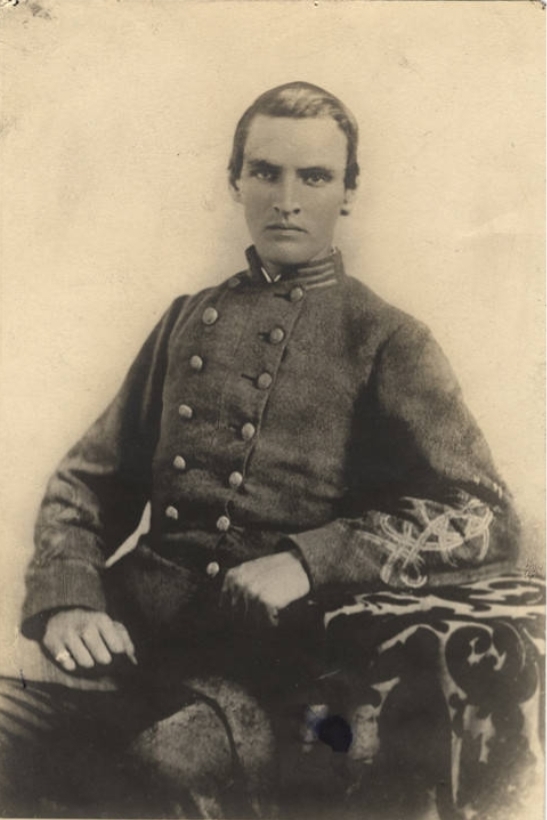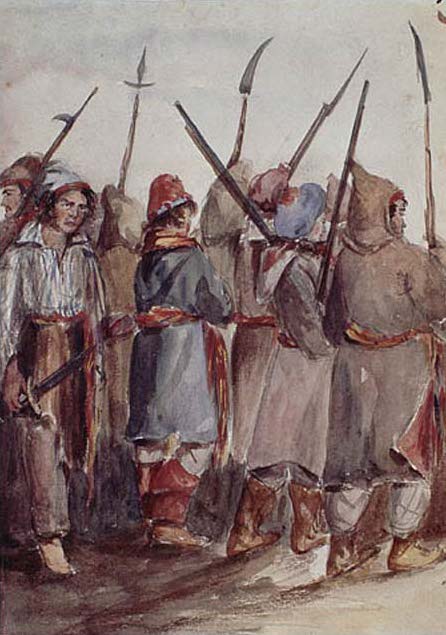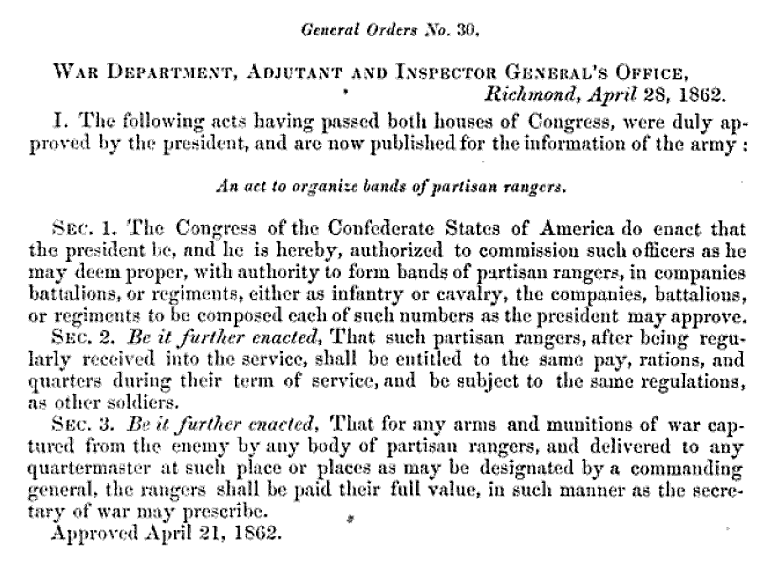|
53rd Alabama Cavalry Regiment
The 53rd Alabama Cavalry Regiment, also known as the 53rd Alabama Partisan Rangers, was a cavalry regiment that served in the Confederate Army during the American Civil War. The regiment was instrumental in the raid to capture a train load of cattle destined for General Sherman during the Atlanta Campaign. The unit continued a guerrilla action as General Sherman marched to the sea in his scorched earth campaign to Savannah. The 53rd served in Mississippi, Alabama, Georgia, Florida and South Carolina. Creation of Unit On April 21, 1862, the Confederate Congress passed the Partisan Ranger Act. The law was intended as a stimulus for recruitment of irregulars for service into the Confederate States Army during the American Civil War. On February 17, 1864 the Partisan Ranger Act was repealed after pressure from Robert E. Lee and other Confederate regulars persuaded Congress to repeal the act. Service The 53rd Alabama Cavalry Regiment was organized at Montgomery, Alabama, in Novemb ... [...More Info...] [...Related Items...] OR: [Wikipedia] [Google] [Baidu] |
Flag Of Alabama (1861, Obverse)
The current flag of Alabama (the second in Alabama state history) was adopted by Act 383 of the Alabama state legislature on February 16, 1895: The cross of St. Andrew referred to in the law is a diagonal cross, known in vexillology as a saltire. Because the bars must be at least wide, small representations of the Alabama flag do not meet the legal definition. In 2001, a survey conducted by the North American Vexillological Association (NAVA) ranked Alabama's state flag 29th in design quality of the 72 Canadian provincial, U.S. state and U.S. territorial flags ranked. There are sources that believe the saltire was intended to memorialize the Confederacy, but no legislative records indicate the inspiration for the flag. History 1861 flag On January 11, 1861, the Alabama Secession Convention passed a resolution designating an official flag. Designed by several women from Montgomery, final touches were made by Francis Corra of that city. One side of the flag displayed the ... [...More Info...] [...Related Items...] OR: [Wikipedia] [Google] [Baidu] |
Congress Of The Confederate States
The Confederate States Congress was both the provisional and permanent legislative assembly of the Confederate States of America that existed from 1861 to 1865. Its actions were for the most part concerned with measures to establish a new national government for the Southern "revolution", and to prosecute a war that had to be sustained throughout the existence of the Confederacy. At first, it met as a provisional congress both in Montgomery, Alabama and Richmond, Virginia. As was the case for the provisional Congress after it moved to Richmond, the permanent Congress met in the existing Virginia State Capitol, a building which it shared with the secessionist Virginia General Assembly. The precursor to the permanent legislature was the Provisional Congress of the Confederate States, which helped establish the Confederacy as a state. Following elections held in states, refugee colonies and army camps in November 1861, the 1st Confederate Congress met in four sessions. The 186 ... [...More Info...] [...Related Items...] OR: [Wikipedia] [Google] [Baidu] |
Units And Formations Of The Confederate States Army From Alabama
Unit may refer to: Arts and entertainment * UNIT, a fictional military organization in the science fiction television series ''Doctor Who'' * Unit of action, a discrete piece of action (or beat) in a theatrical presentation Music * ''Unit'' (album), 1997 album by the Australian band Regurgitator * The Units, a synthpunk band Television * ''The Unit'', an American television series * '' The Unit: Idol Rebooting Project'', South Korean reality TV survival show Business * Stock keeping unit, a discrete inventory management construct * Strategic business unit, a profit center which focuses on product offering and market segment * Unit of account, a monetary unit of measurement * Unit coin, a small coin or medallion (usually military), bearing an organization's insignia or emblem * Work unit, the name given to a place of employment in the People's Republic of China Science and technology Science and medicine * Unit, a vessel or section of a chemical plant * Blood unit, a measurement ... [...More Info...] [...Related Items...] OR: [Wikipedia] [Google] [Baidu] |
List Of Alabama Civil War Confederate Units
{{Short description, none This is a list of Alabama Civil War Confederate Units. Infantry * Alabama Brigade * 1st Alabama Infantry Regiment ** Perote Guards (Company D) * 2nd Alabama Infantry Regiment * 3rd Alabama Infantry Regiment * 4th Alabama Infantry Regiment * 5th Alabama Infantry Regiment * 6th Alabama Infantry Regiment *7th Alabama Infantry Regiment * 8th Alabama Infantry Regiment * 9th Alabama Infantry Regiment *10th Alabama Infantry Regiment *11th Alabama Infantry Regiment * 12th Alabama Infantry Regiment *13th Alabama Infantry Regiment * 14th Alabama Infantry Regiment *15th Alabama Infantry Regiment * 16th Alabama Infantry Regiment *17th Alabama Infantry Regiment *18th Alabama Infantry Regiment *19th Alabama Infantry Regiment *20th Alabama Infantry Regiment *21st Alabama Infantry Regiment *22nd Alabama Infantry Regiment *23rd Alabama Infantry Regiment *24th Alabama Infantry Regiment *25th Alabama Infantry Regiment *26th Alabama Infantry Regiment * 27th Alabama Infantry ... [...More Info...] [...Related Items...] OR: [Wikipedia] [Google] [Baidu] |
Thomas F
Thomas may refer to: People * List of people with given name Thomas * Thomas (name) * Thomas (surname) * Saint Thomas (other) * Thomas Aquinas (1225–1274) Italian Dominican friar, philosopher, and Doctor of the Church * Thomas the Apostle * Thomas (bishop of the East Angles) (fl. 640s–650s), medieval Bishop of the East Angles * Thomas (Archdeacon of Barnstaple) (fl. 1203), Archdeacon of Barnstaple * Thomas, Count of Perche (1195–1217), Count of Perche * Thomas (bishop of Finland) (1248), first known Bishop of Finland * Thomas, Earl of Mar (1330–1377), 14th-century Earl, Aberdeen, Scotland Geography Places in the United States * Thomas, Illinois * Thomas, Indiana * Thomas, Oklahoma * Thomas, Oregon * Thomas, South Dakota * Thomas, Virginia * Thomas, Washington * Thomas, West Virginia * Thomas County (other) * Thomas Township (other) Elsewhere * Thomas Glacier (Greenland) Arts, entertainment, and media * ''Thomas'' (Burton novel) 1969 novel ... [...More Info...] [...Related Items...] OR: [Wikipedia] [Google] [Baidu] |
John F
John is a common English name and surname: * John (given name) * John (surname) John may also refer to: New Testament Works * Gospel of John, a title often shortened to John * First Epistle of John, often shortened to 1 John * Second Epistle of John, often shortened to 2 John * Third Epistle of John, often shortened to 3 John People * John the Baptist (died c. AD 30), regarded as a prophet and the forerunner of Jesus Christ * John the Apostle (lived c. AD 30), one of the twelve apostles of Jesus * John the Evangelist, assigned author of the Fourth Gospel, once identified with the Apostle * John of Patmos, also known as John the Divine or John the Revelator, the author of the Book of Revelation, once identified with the Apostle * John the Presbyter, a figure either identified with or distinguished from the Apostle, the Evangelist and John of Patmos Other people with the given name Religious figures * John, father of Andrew the Apostle and Saint Peter * Pope Jo ... [...More Info...] [...Related Items...] OR: [Wikipedia] [Google] [Baidu] |
Moses Wright Hannon
Moses Wright Hannon (December 14, 1827 – June 3, 1897) was a Confederate States Army colonel during the American Civil War. In August 1864, he was assigned to duty as an acting brigadier general by General John Bell Hood, subject to appointment by Confederate President Jefferson Davis and confirmation by the Confederate Senate. Although Hannon commanded a brigade in the cavalry corps of the Army of Tennessee and in Major General Joseph Wheeler's cavalry corps from June 1864 until the end of the war, he never was officially appointed by Jefferson Davis and confirmed by the Confederate Senate to brigadier general rank. Early life Moses Wright Hanson was born in Baldwin County, Georgia on December 14, 1827.Allardice, Bruce S.'' More Generals in Gray.'' Baton Rouge: Louisiana State University Press, 1995. (pbk.). p. 114.Eicher, John H., and David J. Eicher. ''Civil War High Commands''. Stanford, CA: Stanford University Press, 2001. . p. 599. His parents were John and Elizabeth ... [...More Info...] [...Related Items...] OR: [Wikipedia] [Google] [Baidu] |
Colonel
Colonel (abbreviated as Col., Col or COL) is a senior military officer rank used in many countries. It is also used in some police forces and paramilitary organizations. In the 17th, 18th and 19th centuries, a colonel was typically in charge of a regiment in an army. Modern usage varies greatly, and in some cases, the term is used as an honorific title that may have no direct relationship to military service. The rank of colonel is typically above the rank of lieutenant colonel. The rank above colonel is typically called brigadier, brigade general or brigadier general. In some smaller military forces, such as those of Monaco or the Vatican, colonel is the highest rank. Equivalent naval ranks may be called captain or ship-of-the-line captain. In the Commonwealth's air force ranking system, the equivalent rank is group captain. History and origins By the end of the late medieval period, a group of "companies" was referred to as a "column" of an army. According to Raymond Ol ... [...More Info...] [...Related Items...] OR: [Wikipedia] [Google] [Baidu] |
Robert E
The name Robert is an ancient Germanic given name, from Proto-Germanic "fame" and "bright" (''Hrōþiberhtaz''). Compare Old Dutch ''Robrecht'' and Old High German ''Hrodebert'' (a compound of '' Hruod'' ( non, Hróðr) "fame, glory, honour, praise, renown" and ''berht'' "bright, light, shining"). It is the second most frequently used given name of ancient Germanic origin. It is also in use as a surname. Another commonly used form of the name is Rupert. After becoming widely used in Continental Europe it entered England in its Old French form ''Robert'', where an Old English cognate form (''Hrēodbēorht'', ''Hrodberht'', ''Hrēodbēorð'', ''Hrœdbœrð'', ''Hrœdberð'', ''Hrōðberχtŕ'') had existed before the Norman Conquest. The feminine version is Roberta. The Italian, Portuguese, and Spanish form is Roberto. Robert is also a common name in many Germanic languages, including English, German, Dutch, Norwegian, Swedish, Scots, Danish, and Icelandic. It can be use ... [...More Info...] [...Related Items...] OR: [Wikipedia] [Google] [Baidu] |
Confederate States Army
The Confederate States Army, also called the Confederate Army or the Southern Army, was the military land force of the Confederate States of America (commonly referred to as the Confederacy) during the American Civil War (1861–1865), fighting against the United States forces to win the independence of the Southern states and uphold the institution of slavery. On February 28, 1861, the Provisional Confederate Congress established a provisional volunteer army and gave control over military operations and authority for mustering state forces and volunteers to the newly chosen Confederate president, Jefferson Davis. Davis was a graduate of the U.S. Military Academy, and colonel of a volunteer regiment during the Mexican–American War. He had also been a United States senator from Mississippi and U.S. Secretary of War under President Franklin Pierce. On March 1, 1861, on behalf of the Confederate government, Davis assumed control of the military situation at Charleston, South C ... [...More Info...] [...Related Items...] OR: [Wikipedia] [Google] [Baidu] |
Irregular Military
Irregular military is any non-standard military component that is distinct from a country's national armed forces. Being defined by exclusion, there is significant variance in what comes under the term. It can refer to the type of military organization, or to the type of tactics used. An irregular military organization is one which is not part of the regular army organization. Without standard military unit organization, various more general names are often used; such organizations may be called a ''troop'', ''group'', ''unit'', ''column'', ''band'', or ''force''. Irregulars are soldiers or warriors that are members of these organizations, or are members of special military units that employ irregular military tactics. This also applies to irregular infantry and irregular cavalry units. Irregular warfare is warfare employing the tactics commonly used by irregular military organizations. This involves avoiding large-scale combat, and focusing on small, stealthy, hit-and-run ... [...More Info...] [...Related Items...] OR: [Wikipedia] [Google] [Baidu] |
Partisan Ranger Act
The Partisan Ranger Act was passed on April 21, 1862 by the Confederate Congress. It was intended as a stimulus for recruitment of irregulars for service into the Confederate Army during the American Civil War. The Confederate leadership, like the Union leadership, later opposed the use of unconventional warfare out of fear the lack of discipline among rival guerrilla groups could spiral out of control. On February 17, 1864, the law was repealed after pressure from General Robert E. Lee and other Confederate regulars. Only two partisan Ranger groups were exempt and allowed to continue to operate: Mosby's Raiders and McNeill's Rangers. Background Initially, Confederate President Jefferson Davis did not approve of unconventional warfare because it reduced the number of able men eligible to serve in the regular army. However, after conventional Confederate forces were driven out of western Virginia in the summer and early fall of 1861, pro-Confederate unconventional combata ... [...More Info...] [...Related Items...] OR: [Wikipedia] [Google] [Baidu] |





